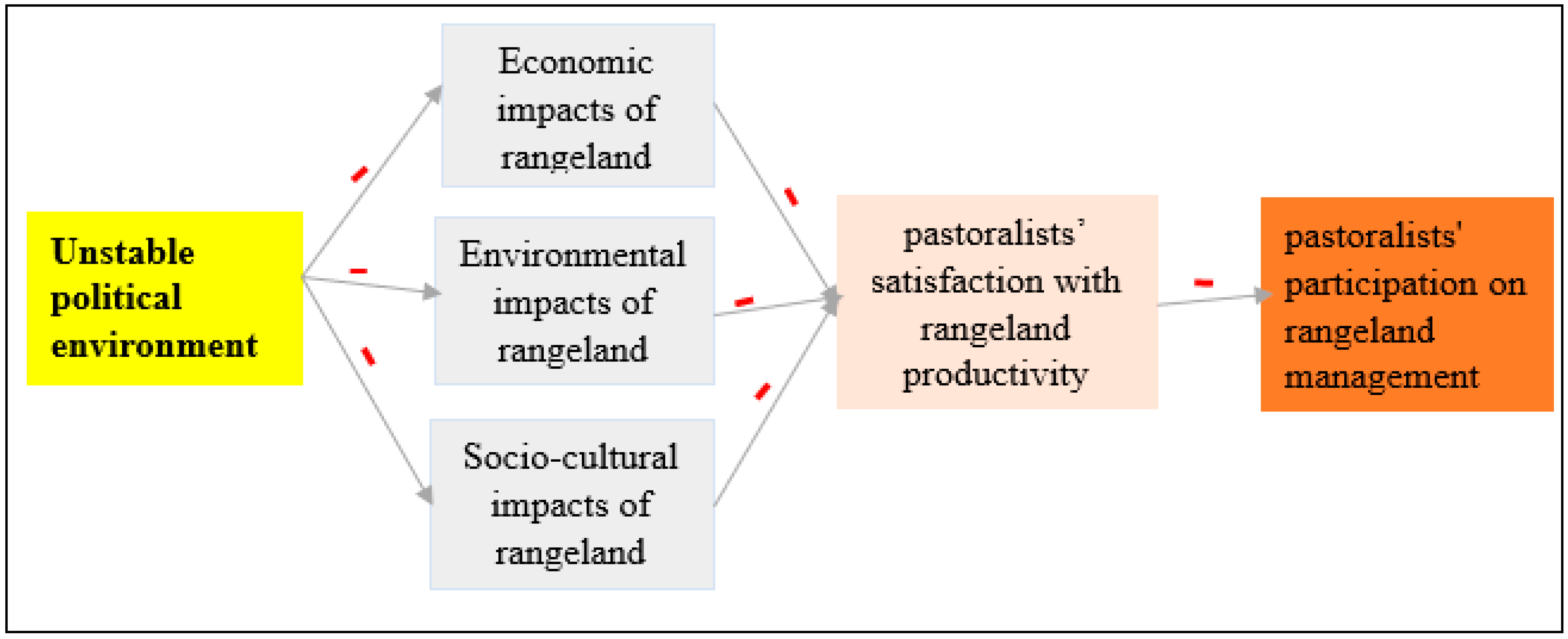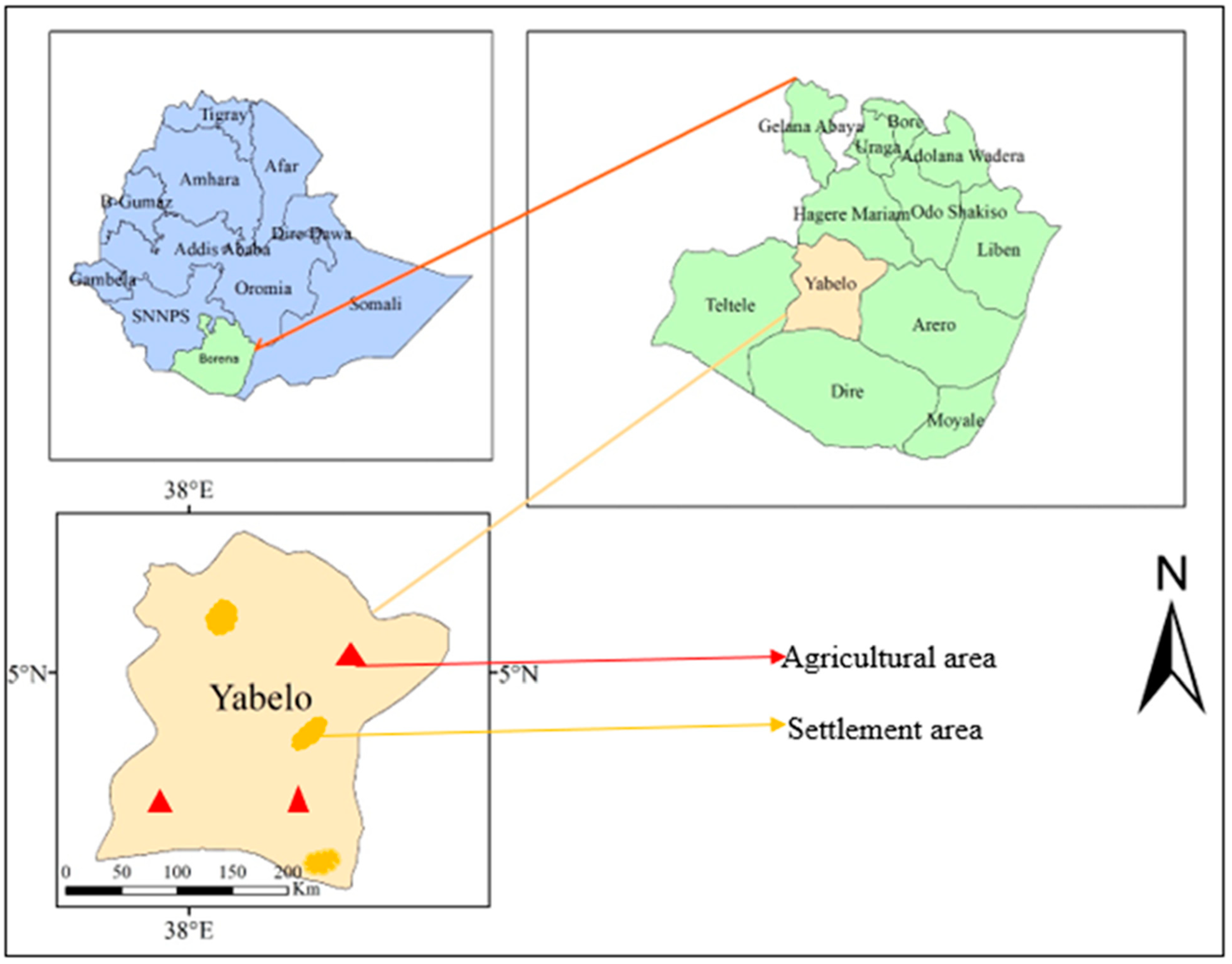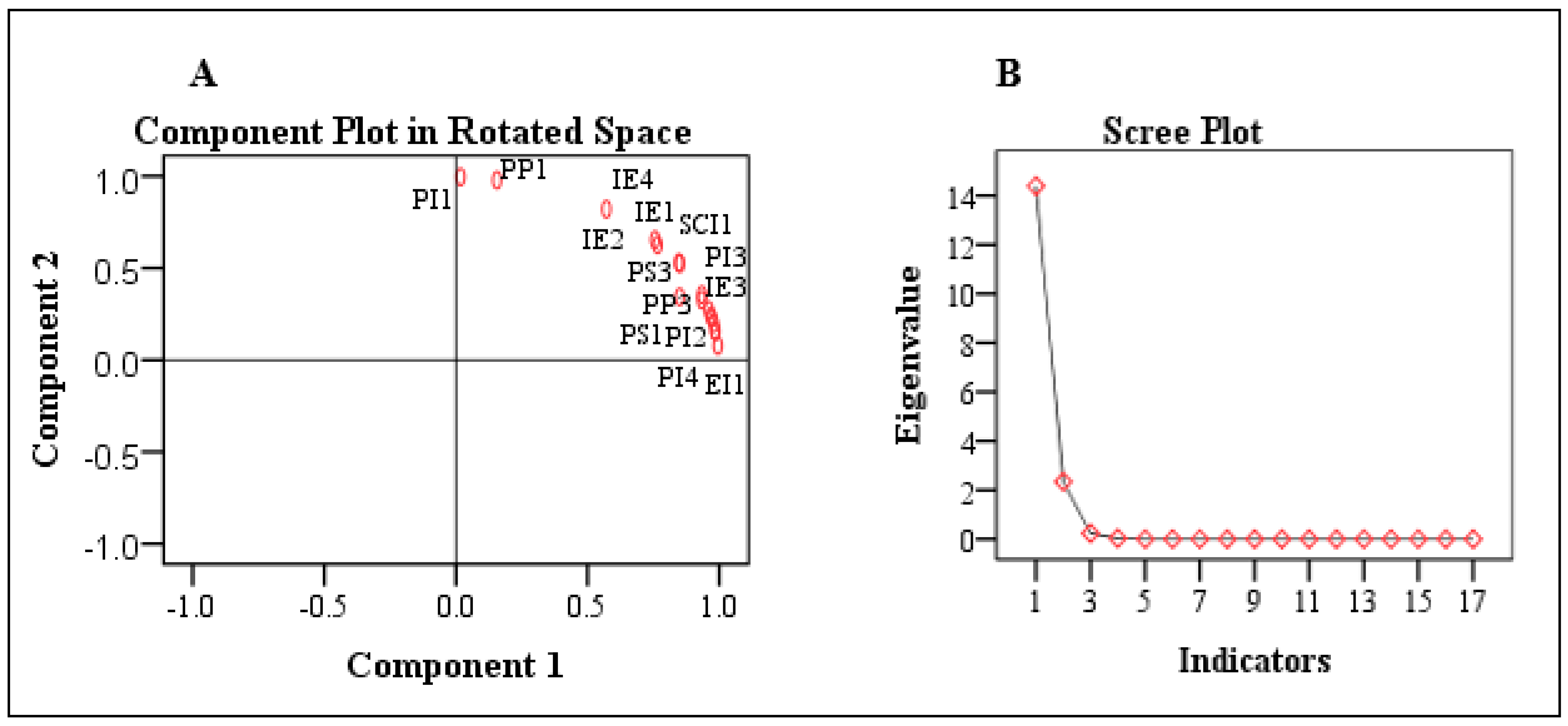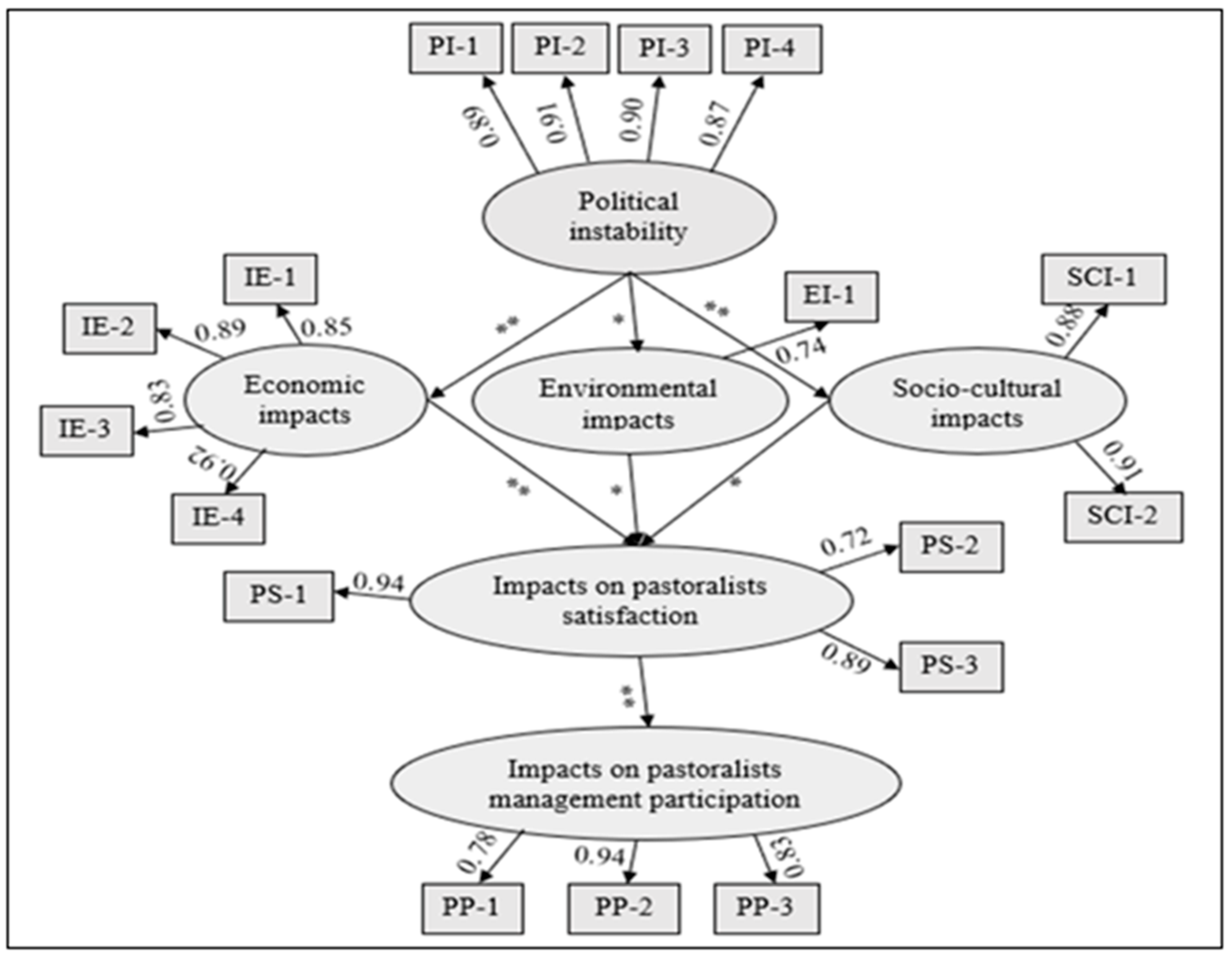The Impact of Political Instability on Sustainable Rangeland Management: A Study of Borana Rangeland, Southern Ethiopia
Abstract
:1. Introduction
Major Causes of Rangeland Degradation in the Study Site
2. Materials and Methods
2.1. Study Area
2.2. Data Sources and Methods
2.3. Data Analysis
3. Results
3.1. Socio-Demographic Characteristics of the Respondents
3.2. Analysis of Sustainable Rangeland Management Indicators
3.3. Impact Analysis of Political Instability
4. Discussion
5. Conclusions
Author Contributions
Funding
Institutional Review Board Statement
Informed Consent Statement
Data Availability Statement
Acknowledgments
Conflicts of Interest
Abbreviations
| PI | Political instability |
| PCA | Principal component analysis |
| CFA | Confirmatory factor analysis |
| KMO | Kaiser–Meyer–Olkin |
| SEM | Structural equation modelling |
References
- Adger, N.W.; Benjaminsen, T.A.; Brown, K.; Svarstad, H. Advancing a Political Ecology of Global Environmental Discourses. Dev. Chang. 2001, 32, 681–715. [Google Scholar] [CrossRef] [Green Version]
- Akbar, I.; Yang, Z.; Han, F.; Kanat, G. The influence of negative political environment on sustainable tourism: A study of aksu-jabagly world heritage site, Kazakhstan. Sustainability 2020, 12, 143. [Google Scholar] [CrossRef] [Green Version]
- Dong, S.; Wolf, S.A.; Lassoie, J.P.; Liu, S.; Long, R.; Yi, S.; Jasra, A.W.; Phuntsho, K. Bridging the gaps between science and policy for the sustainable management of rangeland resources in the developing world. Bioscience 2017, 67, 656–663. [Google Scholar]
- Dong, S.K.; Lassoie, J.; Wen, L.; Li, Y. Degradation of rangeland ecosystems in the developing world: Tragedy of breaking coupled human-natural systems. Int. J. Sustain. Soc. 2012, 4, 357–371. [Google Scholar] [CrossRef]
- Aliyi, K. Causes and effects of rangeland degradation in the lowland districts of the bale eco-region, southeastern ethiopia. J. Rangel. Sci. 2019, 9, 259–276. [Google Scholar]
- Fenetahun, Y.; Xu, X.W.; Wang, Y.D. Forage composition, biomass and carrying capacity dynamics in Yabello rangeland, Southern Ethiopia using different grazing sites. Appl. Ecol. Environ. Res. 2020, 18, 7233–7253. [Google Scholar] [CrossRef]
- Ahmad, S.; Islam, M.; Mirza, S.N. Rangeland degradation and management approaches in Baluchistan, Pakistan. Pak. J. Bot. 2012, 44, 127–136. [Google Scholar]
- Tache, B. Pastoralism under Stress: Resources, Institutions and Poverty among the Borana Oromo in Southern Ethiopia. Ph.D. Thesis, Department of International Environment and Development Studies, Norwegian University of Life Sciences, Akershus, Norway, 2008. [Google Scholar]
- Muhammad, K.; Mohammad, N.; Abdulliah, K.; Mehmet, S.; Ashfaq, A.K.; Wajid, R. Socio-political and ecological stresses on traditional pastoral systems: A review. J. Geogr. Sci. 2019, 29, 1–13. [Google Scholar] [CrossRef] [Green Version]
- Abera, A.; Yirgu, T.; Uncha, A. Impact of resettlement scheme on vegetation cover and its implications on conservation in Chewaka district of Ethiopia. Environ. Syst. Res. 2020, 9–26. [Google Scholar] [CrossRef]
- Aster, A.; Lars, O.E.; Øystein, H.; Tormod, Å.; Adugna, T. Pastoralists’ perceptions of feed scarcity and livestock poisoning in southern rangelands, Ethiopia. Trop. Anim. Health Prod. 2020, 44, 149–157. [Google Scholar]
- Ayalew, G. Pastoralism Under Pressure: Land Alienation and Pastoral Transformations among the Karrayu of Eastern Ethiopia, 1941 to the Present; Shaker Publishing: Maastricht, The Netherlands, 2001. [Google Scholar]
- Fenetahun, Y.; Xu, X.W.; Wang, Y.D. Analysis of eco-environmental vulnerability: Implication for bush encroachment and livestock population dynamics of the Teltele rangeland, southern Ethiopia. Appl. Ecol. Environ. Res. 2020, 18, 7255–7278. [Google Scholar] [CrossRef]
- Devereaux, S. Vulnerable Livelihoods in Somali Region, Ethiopia; IDS Research Report No. 57; Institute of Development Studies: Brighton, UK, 2006. [Google Scholar]
- Mganga, K.Z.; Musimba, N.K.R.; Nyariki, D.M. Combining sustainable land management technologies to combat land degradation and improve rural livelihoods in semi-arid lands in Kenya. Environ. Manag. 2015, 56, 1538–1548. [Google Scholar] [CrossRef] [PubMed]
- Mohammed, M.; Habtamu, T.; Yared, M. Land use/cover change analysis and local community perception towards land cover change in the lowland of Bale rangelands, Southeast Ethiopia. Int. J. Biodivers. Conserv. 2017, 9, 363–372. [Google Scholar] [CrossRef]
- Teague, W.R.; Dowhower, S.L.; Baker, S.A.; Haile, N.; DeLaune, P.B.; Conover, D.M. Grazing management impacts on vegetation, soil biota and soil chemical, physical and hydrological properties in tall grass prairie. Agric. Ecosyst. Environ. 2011, 141, 310–322. [Google Scholar] [CrossRef]
- Amaha, K.E.; Snyman, H.A.; Smit, G.N. Impact of rangeland degradation on the pastoral production systems, livelihood and perceptions of the Somali pastoralists in eastern Ethiopia. J. Arid Environ. 2008, 51, 45–64. [Google Scholar]
- Abate, T.B. Land Cover Dynamics in Savanna Ecosystem of Borena Ethiopia. Master’s Thesis, Institute for Geoinformatics University of Münster, Muenster, Germany, March 2011. [Google Scholar]
- Mussa, M.; Hashim, H.; Teha, M. Rangeland degradation: Extent, impacts, and alternative restoration techniques in the rangelands of Ethiopia. Trop. Subtrop. Agroecosyst. 2016, 19, 16–29. [Google Scholar]
- Raj, K. The Impact of Rangeland Condition and Trend to the Grazing Resources of a 480 Semi-arid Environment in Kenya. J. Hum. Ecol. 2005, 17, 143–147. [Google Scholar]
- Angassa, A.; Oba, G. Herder perceptions on impacts of range enclosures, crop farming, fire ban and bush encroachment on the rangelands of Borana, Southern Ethiopia. Hum. Ecol. 2008, 36, 201–215. [Google Scholar] [CrossRef]
- Baars, R.M.T.; Aptidon, S.M. Pastoralists perceptions of rangeland degradation in Eastern Ethiopia. Nomadic Peoples 2002, 144–157. [Google Scholar] [CrossRef]
- Beyene, F. Incentives and challenges in community-based rangeland management: Evidence from Eastern Ethiopia. Land Degrad. Dev. 2015, 509, 502–509. [Google Scholar] [CrossRef]
- Yeneayehu, F.; Wang, Y.D.; Yuan, Y.; Xu, X. Dynamics of forage and land cover changes in Teltele district of Borana rangelands, southern Ethiopia: Using geospatial and field survey data. BMC Ecol. 2020, 10, 20–55. [Google Scholar]
- Omondi, S.; Odhiambo, M. Pastoralism, Policies and Practice in the Horn and East Africa a Review of Current Trends; Humanitarian Policy Group Commission Report, Overseas Development Institute: London, UK, 2009. [Google Scholar]
- Tefera, B.; Ayele, G.; Atnafe, Y.; Jabbar, M.A.; Dubale, P. Nature and Causes of Land Degradation in the Oromiya Region: A Review; Socio-Economics and Policy Research Working Paper 35; ILRI (aka ILCA and ILRAD): Nairobi, Kenya, 2002; p. 82. [Google Scholar]
- Feeny, D.; Berkes, F.; McCay, B.J.; Acheson, J.M. The tragedy of the commons: Twenty-two years later. Hum. Ecol. 1990, 18, 1–19. [Google Scholar] [CrossRef] [PubMed]
- Blewett, R.A. Property rights as a cause of the tragedy of the commons: Institutional change and the pastoral Maasai of Kenya. East. Econ. J. 1995, 21, 477–490. [Google Scholar]
- Mihaliˇc, T.; Šegota, T.; Cvelbar, L.K.; Kuščer, K. The influence of the political environment and destination governance on sustainable tourism development: A study of Bled, Slovenia. J. Sustain. Tour. 2016, 24, 1489–1505. [Google Scholar] [CrossRef]
- Gebre, A. Conflict management, resolution and institutions among the Karrayyu and their neighbors. In African Pastoralism: Conflict, Institutions and Government; Dietz, M.A.M., Ahmed, A.G.M., Eds.; Pluto Press: London, UK, 2001; pp. 81–99. [Google Scholar]
- Abdulahi, M. The changing nature of pastoral conflicts in South-Eastern Ethiopia. In Pastoral Sedentarisation, Natural Resource Management, and Livelihood Diversification in Marsabit District, Northern Kenya, 2008; Witsenburg, W.R., Ed.; Edwin Mellen: Lewiston, ID, USA, 2005. [Google Scholar]
- Hagmann, T.; Mulugeta, A. Pastoral conflicts and state-building in the Ethiopian lowlands. Afr. Spectr. 2008, 43, 19–37. [Google Scholar]
- Ethiopia Ministry of Information (MoI). Rural Development Policies, Strategies and Tactics of The Federal Democratic Republic of Ethiopia (Translated from Amharic); MoI: Addis Ababa, Ethiopia, 2001. [Google Scholar]
- Bramwell, B.; Lane, B. Critical research on the governance of tourism and sustainability. J. Sustain. Tour. 2011, 19, 411–421. [Google Scholar] [CrossRef]
- Egeimi, O.; Abdel, M.M.; Sid, A.A. Conflict Transformation: Pastoralists and Settled Farmers. In Compas Magazine for Endogenous Development; Compas Programs of ETC Foundation: Leusden, The Netherland, 2003. [Google Scholar]
- Abdelrahim, O.A.; Galal, A.F.K. Competition on Rangeland Utilizations Conflict Source among Users in Semi-Arid Areas at Eldebeibat, South Kordofan State-Sudan. J. Rangel. Sci. 2020, 10, 149–161. [Google Scholar]
- Therese, F.; Yogo, T.U. Youth Unemployment and Political Instability in Selected Developing Countries; Working Paper Series N° 171; African Development Bank: Tunis, Tunisia, 2013. [Google Scholar]
- Bassi, M.; Tache, B. The Borana conserved landscape, Ethiopia. In Protected Landscapes and Agrobiodiversity Values. Volume I of Values of Protected Landscapes and Seascapes; Amend, T., Brown, J., Kothari, A., Phillips, A., Stolton, S., Eds.; Kasparek Verlag: Heidelberg, Germany, 2008; pp. 105–115. [Google Scholar]
- Simachew, B.W. Natural resource degradation tendencies in Ethiopia: A review. Wassie Environ. Syst. Res. 2020, 9, 33. [Google Scholar]
- Peters, P.E. Conflicts over land and threats to customary tenure in Africa. Affairs 2013, 112, 543–562. [Google Scholar] [CrossRef] [Green Version]
- Dalle, G.; Maass, B.L.; Isselstein, J. Rangeland condition and trend in the semi-arid Borana lowlands, southern Oromia, Ethiopia. Afr. J. Range Forage Sci. 2015, 23, 49–58. [Google Scholar] [CrossRef]
- Angassa, A. The ecological impact of bush encroachment on the yield of grasses in the Borana rangeland ecosystem. Afr. J. Ecol. 2014, 43, 14–20. [Google Scholar] [CrossRef]
- Billi, P.; Alemu, Y.T.; Ciampalini, R. Increased frequency of flash floods in Dire Dawa, Ethiopia: Change in rainfall intensity or human impact? Nat. Hazards 2015, 76, 1373–1394. [Google Scholar] [CrossRef]
- Gemedo, D. Evaluation of forage quantity and quality in the semi-arid Borana Lowlands, Southern Oromia, Ethiopia. Trop. Grassl. Forrajes Trop. 2020, 8, 72–85. [Google Scholar]
- Yedam, H.; Oh, Y.K.; So, Y.P.; Tai, Y.Y.; Young-eun, K. Reliability and validity test of the Korean version of Noe’s evaluation. Korean J. Med. Educ. 2017, 29, 15–26. [Google Scholar]
- Moon, S.; Kim, D.H.; Kim, E.J.; Kim, Y.J.; Lee, S. Evaluation of the validity and reliability of the Korean version of the Nursing Professional Values Scale-Revised. Nurse Educ. Today 2014, 34, 325–330. [Google Scholar] [CrossRef]
- Qiang, D.; Jia, L. SPSS Statistical Analysis from Entry to the Master; Posts & Telecom Press: Beijing, China, 2009. (In Chinese) [Google Scholar]
- Schilling, J.; Opiyo, F.E.; Scheffran, J. Raiding pastoral livelihoods: Motives and effects of violent conflict in north-western Kenya. Pastor. Res. Policy Pract. 2012, 2, 1–16. [Google Scholar] [CrossRef] [Green Version]
- Mihaliˇc, T.; Kaspar, C. Umweltökonomie im Tourismus; Haupt: Bern, Switzerland, 1996. [Google Scholar]
- Markakis, J. Pastoralism on the Margin; Minority Rights Group International: London, UK, 2004; pp. 2–37. [Google Scholar]
- Mattee, A.Z.; Shem, M. Ambivalence and Contradiction: A Review of the Policy Environment in Tanzania in Relation to Pastoralism; Drylands Issue Paper No. 140; IIED: London, UK, 2006. [Google Scholar]
- Westreicher, C.A.; Mérega, J.L.; Palmili, G. The economics of pastoralism: Study on current practices in South America. Nomadic Peoples 2007, 11, 87–105. [Google Scholar] [CrossRef]
- Admasu, T.E.; Abule, A.; Tessema, Z.K. Livestock-rangeland management practices and community perceptions towards rangeland degradation in South Omo zone of Southern Ethiopia. Livest. Res. Rural Dev. 2010, 22, 5. [Google Scholar]





| Characteristics | Frequency | Percentage |
|---|---|---|
| Gender | ||
| Male | 200 | 66.7 |
| Female | 100 | 33.3 |
| Age (years) | ||
| Young (20–35) | 111 | 37.0 |
| Middle (36–52) | 147 | 49.0 |
| Elder (≥52) | 42 | 14.0 |
| Ethnicity | ||
| Amhara | 14 | 4.7 |
| Oromo | 262 | 87.3 |
| Tigray | 5 | 1.7 |
| Others | 19 | 6.3 |
| Education | ||
| Primary school (Grade 1–8) | 152 | 50.7 |
| High school (Grade 9–12) | 66 | 22.0 |
| Tertiary education (college and university) | 33 | 11.0 |
| Not educated | 49 | 16.3 |
| Occupation | ||
| Livestock rearing | 249 | 83.0 |
| Employment | 43 | 14.3 |
| Business | 93 | 31.0 |
| Labor work | 17 | 5.7 |
| Annual income ($) | ||
| Below 500 | 67 | 22.3 |
| 500–1000 | 188 | 62.7 |
| 1000–1500 | 28 | 9.3 |
| Above 1500 | 17 | 5.7 |
| Annual household income rate from rangeland (%) | ||
| 0 | - | - |
| 1–25 | 27 | 9.0 |
| 26–50 | 39 | 13.0 |
| 51–75 | 91 | 30.3 |
| 76–100 | 143 | 47.7 |
| List of Indicators | Responses in % | ||||
|---|---|---|---|---|---|
| SA | A | N | DA | SDA | |
| Political Instability | |||||
| PI-1 Rangeland management activities is less concerned by the local and national government. | 78.3 | 17.0 | 0.7 | 2.3 | 1.7 |
| PI-2 The local rangeland areas has frequently expose for interest conflict. | 22.3 | 66.0 | 4.3 | 3.0 | 4.4 |
| PI-3 Local pastoralists are claimed about fair utilization of rangeland. | 27.0 | 56.3 | 4.0 | 7.3 | 5.4 |
| PI-4 Key rangeland areas monopolized by a few politically powerful people and their families. | 18.0 | 77.7 | 1.0 | 2.0 | 1.3 |
| Impacts on economic aspect | |||||
| IE-1 The gap between the rich and poor in the rangeland area increased. | 38.7 | 49.0 | 9.3 | 3.0 | - |
| IE-2 Living costs of the community doubled. | 44.7 | 55.3 | - | - | - |
| IE-3 Mobilization of livestock’s restricted and caused hunger and less productivity. | 22.3 | 73.0 | 1.0 | 3.0 | 0.7 |
| IE-4 Freely movement is become under risk and make the life more difficult those who have hand-to-mouth way of life. | 53.7 | 45.0 | 1.3 | - | - |
| Impacts on environment | |||||
| EI-1 Frequent political instability impact on the life both plant and animals (through high displacement of pastoralists, pollution etc.). | 12.7 | 83.7 | 1.0 | 2.3 | 0.3 |
| Impacts on socio-cultural aspect | |||||
| SCI-1 Political instability can cause loss for local culture and social interaction. | 36.7 | 59.0 | 2.0 | 0.7 | 1.6 |
| SCI-2 Political instability limits cultural exchanges and infrastructure access. | 17.7 | 82.0 | 0.3 | - | - |
| Pastoralists satisfaction with rangeland productivity | |||||
| PS-1 I am not satisfied with the rangeland management activities. | 26.0 | 53.0 | 5.7 | 13.7 | 1.6 |
| PS-2 I am not satisfied with pastoralists involvement and follow-up in the planning and implementation of management practice in the area. | 20.7 | 67.3 | 4.3 | 7.0 | 0.7 |
| PS-3 I am not satisfied with the rangeland productivity and equitable benefits from it. | 38.0 | 60.7 | 1.0 | 0.3 | - |
| Pastoralists participation on rangeland management activities | |||||
| PP-1 I do not participate in any rangeland management activities. | 48.0 | 23.0 | 10.3 | 3.7 | 13.0 |
| PP-2 I do not participate in any awareness creation program about how to conserve rangeland in a sustainable way. | 26.7 | 44.3 | 1.3 | 22.0 | 5.7 |
| PP-3 I do not participate in the fair and equal sharing of benefits from rangeland. | 23.7 | 56.0 | 4.3 | 11.7 | 4.3 |
| Paired Constructs | t-Values | p-Values | ||
|---|---|---|---|---|
| Economic impacts | <— | Unstable political environment | −19.621 | ** |
| Environmental impacts | <— | Unstable political environment | −3.477 | * |
| Socio-cultural impacts | <— | Unstable political environment | −19.839 | ** |
| Pastoralist’s satisfaction | <— | Economic impacts | −6.670 | ** |
| Pastoralist’s satisfaction | <— | Environmental impacts | −2.702 | * |
| Pastoralist’s satisfaction | <— | Socio-cultural impacts | −2.747 | * |
| Pastoralist’s participation | <— | Pastoralist’s satisfaction | −8.209 | ** |
Publisher’s Note: MDPI stays neutral with regard to jurisdictional claims in published maps and institutional affiliations. |
© 2021 by the authors. Licensee MDPI, Basel, Switzerland. This article is an open access article distributed under the terms and conditions of the Creative Commons Attribution (CC BY) license (https://creativecommons.org/licenses/by/4.0/).
Share and Cite
Fenetahun, Y.; You, Y.; Xu, X.; Nzabarinda, V.; Wang, Y. The Impact of Political Instability on Sustainable Rangeland Management: A Study of Borana Rangeland, Southern Ethiopia. Agriculture 2021, 11, 352. https://doi.org/10.3390/agriculture11040352
Fenetahun Y, You Y, Xu X, Nzabarinda V, Wang Y. The Impact of Political Instability on Sustainable Rangeland Management: A Study of Borana Rangeland, Southern Ethiopia. Agriculture. 2021; 11(4):352. https://doi.org/10.3390/agriculture11040352
Chicago/Turabian StyleFenetahun, Yeneayehu, Yuan You, Xinwen Xu, Vincent Nzabarinda, and Yongdong Wang. 2021. "The Impact of Political Instability on Sustainable Rangeland Management: A Study of Borana Rangeland, Southern Ethiopia" Agriculture 11, no. 4: 352. https://doi.org/10.3390/agriculture11040352
APA StyleFenetahun, Y., You, Y., Xu, X., Nzabarinda, V., & Wang, Y. (2021). The Impact of Political Instability on Sustainable Rangeland Management: A Study of Borana Rangeland, Southern Ethiopia. Agriculture, 11(4), 352. https://doi.org/10.3390/agriculture11040352






